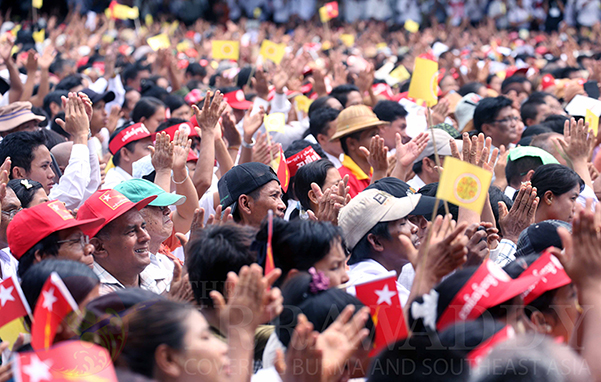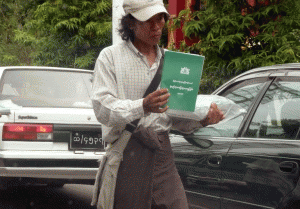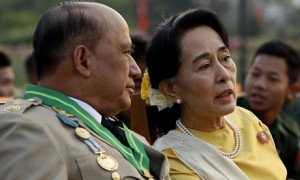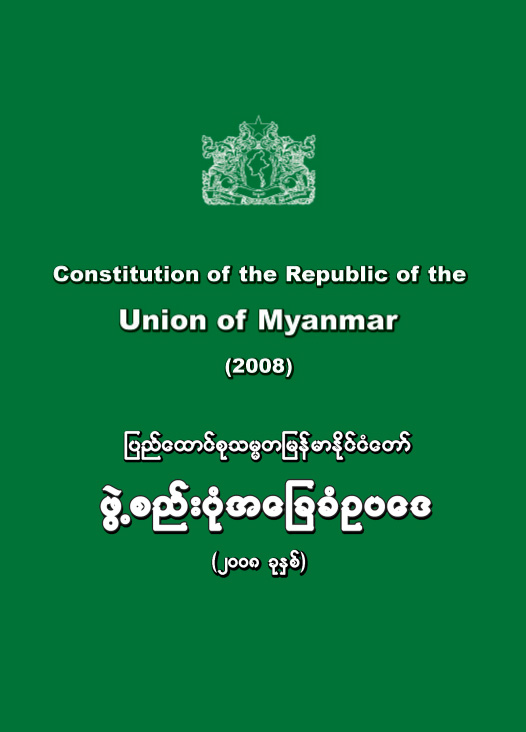Posts Tagged ‘2008 Constitution’ (102 found)
Myanmar: Constitutional Reform, A Crucial Step in the Transition to A More Democratic Nation
GENEVA (23 May 2014) – The United Nations Special Rapporteur on the human rights situation in Myanmar, Tomás Ojea Quintana, today called on Myanmar to press forward with the on-going process of constitutional reform[…]
• • •Burma’s Top Priority Must Be Constitutional Reform for All
 The NLD and 88 Generation Peace and Open Society have been campaigning actively and vociferously for various amendments to the military-drafted 2008 Constitution. Over the weekend, thousands of supporters came out in support of mass rallies for constitutional reform held in Rangoon and Mandalay on Saturday and Sunday, respectively. It is the first time that the two pro-democracy parties have co-hosted an event […]
The NLD and 88 Generation Peace and Open Society have been campaigning actively and vociferously for various amendments to the military-drafted 2008 Constitution. Over the weekend, thousands of supporters came out in support of mass rallies for constitutional reform held in Rangoon and Mandalay on Saturday and Sunday, respectively. It is the first time that the two pro-democracy parties have co-hosted an event […]
Significant Constitutional Changes are a Must for Genuine Democracy
 As the timeframe for submission to the parliamentary Joint Committee for Reviewing the Constitution enters its final month, pressure to amend this flawed document is ratcheting up. Opposition parties, ethnic armed groups, democracy activists, members of the public and Daw Aung San Suu Kyi are all voicing how imperative it is for democracy that the constitution is changed.
As the timeframe for submission to the parliamentary Joint Committee for Reviewing the Constitution enters its final month, pressure to amend this flawed document is ratcheting up. Opposition parties, ethnic armed groups, democracy activists, members of the public and Daw Aung San Suu Kyi are all voicing how imperative it is for democracy that the constitution is changed.
The 2008 Constitution, which the military regime introduced after a sham referendum in 2008, entrenches the Burma Army in positions of power, gives the state the ownership of all land in the country, and denies Burma’s ethnic nationalities equality and the right to self-determination. It also fails on grounds of inclusiveness, omitting to protect and respect the human rights of all people in Burma, regardless of race, religion or color. It is undemocratic, illegitimate and a major hurdle for progress in Burma’s reform process […]
အမ်ဳိးသားဒီမိုကေရစီအဖြဲ႕ခ်ဳပ္ ေၾကညာခ်က္ စာအမွတ္ ၁၄၁ (စည္း)/၁၂/၂၀၁၃
ျမန္မာႏိုင္ငံ၏ ၂၀၀၈ ဖြဲ႕စည္းပံုအေျခခံသပေဒကို ျပဳျပင္ေျပာင္းလဲရန္ လိုအပ္ေနေၾကာင္း ျပည္သူအမ်ားက ဆႏၵထုတ္ေဖာ္ေနၾကသည့္အျပင္ အစိုးရ၊ လႊတ္ေတာ္ႏွင့္ ႏိုင္ငံေရးပါတီမ်ားကလည္း ဖြဲ႕စည္းပံုအေျခခံဥပေဒ ျပဳျပင္ေျပာင္းလဲေရးကို လိုလားေနၾကပါသည္ […]
• • •ရွစ္ေလးလုံး ဒီမိုုကေရစီ အေရးေတာ္ပံုု ေငြရတု ေၾကညာစာတမ္း
ရွစ္ေလးလံုုး ဒီမိုုကေရစီ အေရးေတာ္ပံုု ေငြရတုုအခမ္းအနားသိုု႔ တက္ေရာက္လာေသာ ျပည္တြင္း၊ ျပည္ပ၊ နယ္စပ္ အသီသီး ရွိ ၈၈ မ်ိဳးဆက္အင္အားစုုမ်ား၊ ဒီမိုုကေရစီပါတီမ်ား၊ တိုင္းရင္းသားပါတီမ်ားနွင္႔ လက္နက္ကိုင္ အင္အားစုမ်ား၊ လူထုအေျချပဳအင္အားစုမ်ားနွင္႔ မ်ိဳးဆက္သစ္လူငယ္အင္အားစုမ်ား၊ လယ္သမား၊ အလုပ္သမား မ်ားအပါအဝင္ အလႊာစံုျပည္သူမ်ားသည္ ၂၀၁၃ ခုႏွစ္ ၾသဂုတ္လ ၆ ရက္၊ ၇ ရက္ေန႔မ်ားတြင္ စုစည္းညီညြတ္စြာ ေတြ႕ဆံု၍ ေဆြးေႏြး၍ […]
• • •Statement of the Ethnic Nationalities Conference
1. Under the aegis of the UNFC, an Ethnic Nationality Conference was held from July 29 to 31 at a certain place in the liberated area.
2. A total of 122 delegates, representing the UNFC member organizations, 18 resistance organizations, the United Nationality Alliance, 4 political parties of the ethnic nationalities, youth organizations, women organizations, community-based organizations, the overseas ethnic nationality organizations, academics and active individuals […]
• • •Daw Aung San Suu Kyi’s Political Reconciliation with Burma’s Armed Forces
 On 27 March, Burma’s Armed Forces Day was commemorated with its usual military fanfare. But this year, Daw Aung San Suu Kyi sat in the front row of the parade, raising concerns about her closeness to the army.
On 27 March, Burma’s Armed Forces Day was commemorated with its usual military fanfare. But this year, Daw Aung San Suu Kyi sat in the front row of the parade, raising concerns about her closeness to the army.
Daw Aung San Suu Kyi was similarly criticized for her comment on BBC’s Desert Island Disks radio show about her “fondness” for her father’s army. While Daw Suu appears to be cozying up the Burma Army as an attempt of political reconciliation in her push towards the 2015 elections, the public widely continues to see the country’s security forces as the perpetrators of human rights violations especially in ethnic nationality areas and of brutal crackdowns on civilians in 1988, 2007 and most recently in November 2012 against protesters and monks at the Letpadaung copper mine.
The Burma Army continued this week to launch offensives against the Kachin Independence Army (KIA) in northeastern Shan State, two weeks after the latest peace talks in Ruili, China. There have also been reports of shelling and looting of villages in Kachin State despite President Thein Sein insisting on his visit to Austria at the beginning of the month, “There’s no more hostilities, no more fighting all over the country, we have been able to end this kind of armed conflict.” General Gun Maw, deputy chief of the KIA said after the 11 March talks, “They wanted us to sign a ceasefire agreement first, but there are many issues to discuss about the peace process before we can reach a ceasefire.”
Furthermore, the military has been implicated in the violence in Meikhtila, which has left 43 dead and 12,000 displaced by UN estimates […]
Same Constitution, Same Problems
 The Special Rapporteur on the Situation of Human Rights in Myanmar, Tomás Ojea Quintana, finished his 7th visit to Burma on Saturday and his report highlights the grave human rights concerns in Burma today. The escalation of conflict in Kachin State, communal violence in Arakan State, the continuing detention and torture of political prisoners, land confiscation due to development projects, restrictions on freedom of association and assembly are among the poor human rights conditions stated in his report. The scale of such human rights violations, in spite of the reforms initiated by the government, emphasizes the necessity of the role of the Special Rapporteur.
The Special Rapporteur on the Situation of Human Rights in Myanmar, Tomás Ojea Quintana, finished his 7th visit to Burma on Saturday and his report highlights the grave human rights concerns in Burma today. The escalation of conflict in Kachin State, communal violence in Arakan State, the continuing detention and torture of political prisoners, land confiscation due to development projects, restrictions on freedom of association and assembly are among the poor human rights conditions stated in his report. The scale of such human rights violations, in spite of the reforms initiated by the government, emphasizes the necessity of the role of the Special Rapporteur.
Many of the human rights violations that Quintana reported have a direct obstacle in the path of correcting these abuses: the 2008 Constitution. The 2008 Constitution was written by the military without Daw Aung San Suu Kyi and the National League for Democracy or genuine representation from Burma’s ethnic areas. It was described by the 88 Generation Students Group as a “sham constitution” and through corruption, fraud and intimidation, the ruling junta outrageously claimed that 92% of the people who voted ratified the document […]
List of the Most Problematic Provisions in the 2008 Constitution and Burmese Laws
This document gives an overview of provisions in the 2008 Constitution, Burmese laws and the Penal Code that are, in the view of the BLC, the most problematic for the development of rule of law and democracy in Burma […]
• • •Analysis of the Guarantees of Freedom of Expression in the 2008 Constitution of the Republic of the Union of Myanmar
When it was first introduced in 2008, the new Constitution of the Republic of the Union of Myanmar was deemed to be a great improvement over the previous constitution. An important part of this was the more robust guarantees it included for human rights. And an important part of the latter was its relatively strong guarantees for freedom of expression.
At the same time, the guarantees for freedom of expression in the 2008 Constitution do not fully meet international standards in this area. This Analysis outlines the key attributes of international standards, and indicate how the guarantees of freedom of expression in the 2008 Constitution fail to meet these standards […]
• • •








 All posts
All posts